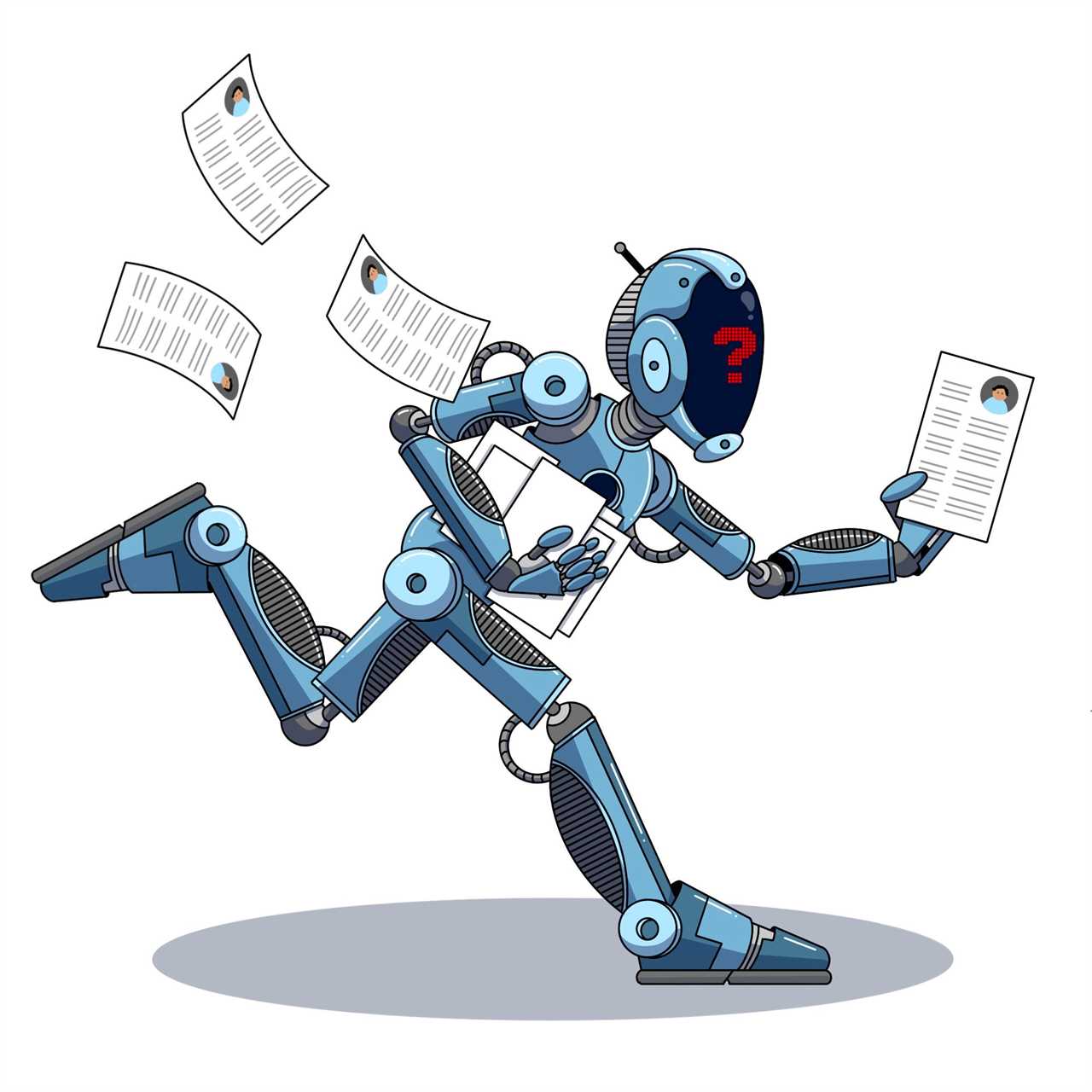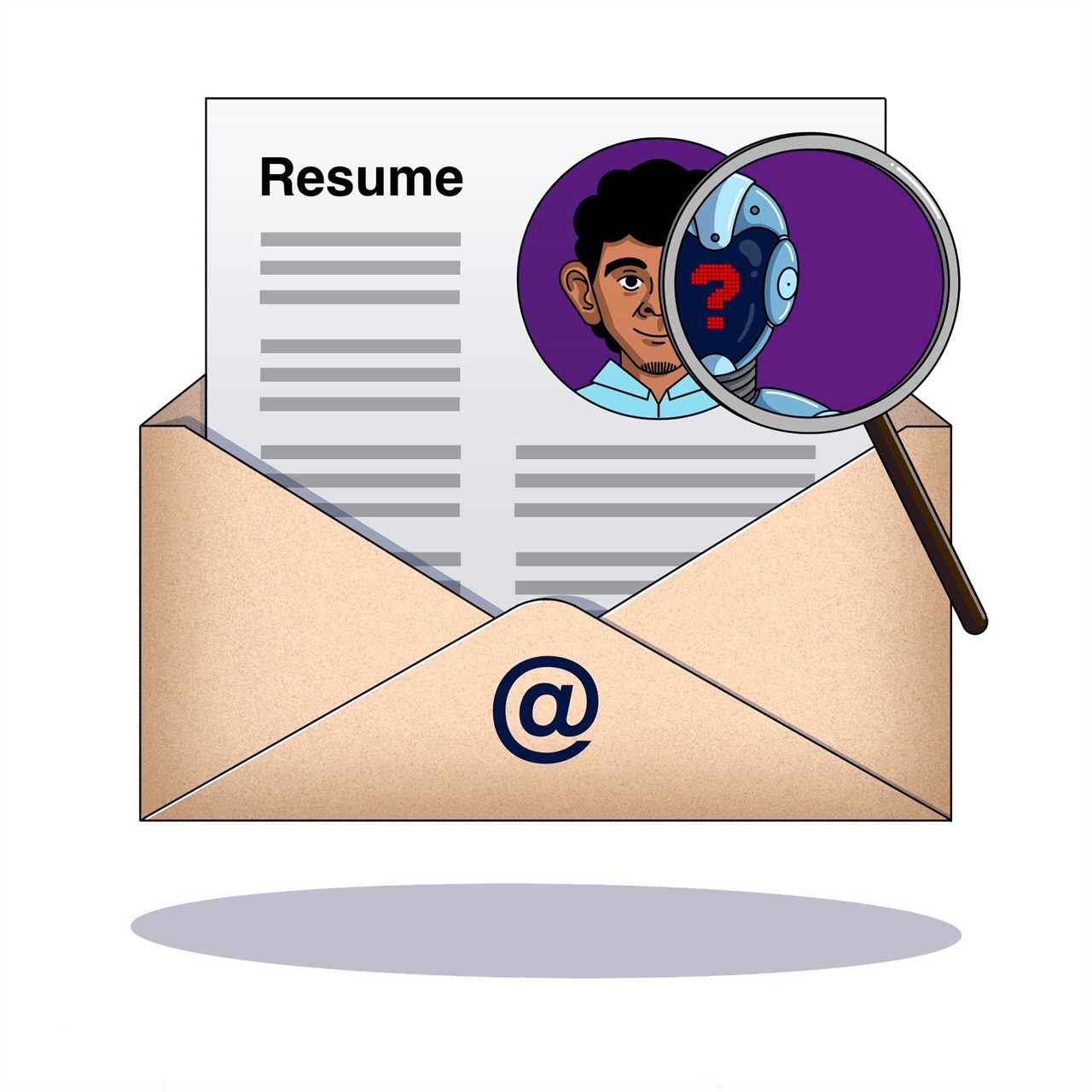Hugo Herrera for BI
In the fall of 2020, I found myself in unfamiliar territory: I was looking for a new job. In theory, it was something I should have known a lot about as an economics reporter. But in practice, I was lost. Because I had stumbled into a great job right out of college, and stayed with that company for a decade, I was blissfully unaware of how soul-crushing it was to be a job seeker in 21st-century corporate America.
I threw myself into the task. I meticulously researched employers. I applied to a dozen openings. I tailored my CV to match each job description. I wrote heartfelt paragraphs about why each role was perfect for me. Yet all I got back was a raft of canned rejection emails — or worse, silence. I was floored that I didn't advance to a single interview. This is terrible, I thought. How does anyone do this? I might as well have been sending my applications out into the ether.
Luckily, I landed a job after a few months. But the experience stayed with me. And these days, applying for a job has turned into even more of a nightmare. In the current market, it's not uncommon for totally unremarkable jobs to attract thousands of applications. Employers are so overwhelmed by the flood of résumés that they're barely able to glance at most of them, let alone read them. The whole process has become an odds game: Job seekers submit their cover letters to hundreds of companies, struggling to stand out among the tsunami of applicants. Things have gotten so grim that LinkedIn no longer trumpets the number of people who have applied to openings on its job portal.
So when I heard that you can now use a bot to mass-apply to job openings, I was intrigued. The bots — with names like LazyApply and Massive — have turned job hunting into a technological arms race. You pay a fee, feed your résumé into the bot, tell it what you're looking for, and blam! — it starts sending out hundreds of applications on your behalf, often in real time. It's the promise of AI, applied to the job market: an intelligent, personalized, HR-slaying machine, designed to land you a gig through a combination of tech-savvy and brute force.
The question is: Do the bots work? I decided to find out. So I went undercover in the age of AI.
I wasn't looking for a job. But late one night I cracked open a beer, updated my résumé, pulled out my credit card, and entrusted my fate to a job-application bot. Which roles would it apply to? How accurately would it reflect my skills and interests to employers? A friend joked, "Does your editor know this story might end in you taking a new role?" The thought hadn't even crossed my mind. I didn't think any employers would actually bite. How could an AI-generated version of me possibly compete in such a crowded and chaotic job market?
Some 120 applications later, I stood corrected.
The first bot I tried was called Sonara. For $79.99 a month, I signed up for the most expensive "amplitude" plan, which would allow me to apply for 420 openings. After I spent a half hour uploading my résumé and completing my profile, Sonara showed me maybe a dozen job options. I greenlighted a few of them, and the bot promised it would send them out. Each morning when I logged back on, it would send me a trickle of new options to consider. But the ones I approved continued to sit in the queue, unsent. It was hardly the job-applying firehose I was looking for. I pinged customer service a few times. Then, after a week, a statement popped up on Sonara's website. The service was shutting down. Great, I thought. There goes my $79.99.
Undeterred, I signed up for WonsultingAI, which seemed like a bargain at only $19.99 a month. It was a little more manual than Sonara: Every time I wanted it to pull in more job openings, I had to input my experience level and specify the title and location of the position I was looking for. It had a cool feature that allowed me to use a different résumé for each job title I applied to, meaning I could highlight different skills and achievements for various positions. But like Sonara, it didn't show me many job openings, and it was pretty glitchy. About one in three applications never went through.

Hugo Herrera for BI
I had more hope for Massive, another bot I tried. True to its name, it showed me way more openings than Sonara and Wonsulting. But it had a limited, preset list of corporate occupations I could apply to. I chose a couple that felt most relevant to what I do: content marketing and PR. For $39 a month, it would send out up to 50 applications a week. Every few days, I would spend 20 minutes sifting through the options and vetoing the jobs that weren't relevant. It all seemed pretty seamless. After a few days, I started getting a steady stream of automated emails from various employers thanking me for submitting my application. Still, 50 applications a week felt pretty tame in the AI age. What I wanted was a true spray-and-pray machine, the AK-47 of job-application bots. For that, I turned to LazyApply.
LazyApply didn't offer a monthly subscription option, so I purchased a lifetime plan for $129. That gave me the ability to submit a maximum of 750 applications per day. (A more expensive plan came with unlimited applications, but I just couldn't imagine sending out more than 750 in a week, let alone a day.) Unlike the other bots, which ingested job openings into their own sites, LazyApply submitted applications via external job boards. So I linked my brand-new LazyApply profile to my accounts on Indeed, ZipRecruiter, and LinkedIn. Then I set it loose.
Unlike the other bots, LazyApply did all the applying in real time, right in front of my eyes. It was as if someone had hacked my computer: I watched as the bot clicked on various boxes and typed out answers to short questions. For the first few minutes, I was mesmerized. Then, I started to panic. In one application, the bot indicated that I speak conversational-level Spanish, which I definitely do not. In another, it reported that I was African American, even though I had specified in my LazyApply profile that I am Asian. I shouldn't have been surprised, given AI's well-known propensity to make stuff up. But I was alarmed. If I had been a real job seeker, I probably would have pulled the plug on the rogue machine. Instead, I let LazyApply do its thing. I was curious to see which jobs, if any, Spanish-speaking African American Aki would land.
Then things got even weirder. A few applications in, I realized that LazyApply wasn't using the updated résumé I had given it. Instead, it was attaching a document I didn't recognize, titled "Aki Ito Cover Letter, Resume, Links for Insider.pdf." That's strange, I thought. Did LazyApply auto-generate a cover letter for me? I wondered whether it was any good. But when I opened the PDF, I saw it was dated October 24, 2020. It read: "Dear Mr. Carlson: I'm writing to apply for the analytical features editor position at Insider." Instead of sending out the updated résumé I'd provided, LazyApply was submitting an old cover letter it had found buried in the depths of my LinkedIn account, from when I had applied to BI three years ago. In a single spurt, 27 employers — ranging from a website I had never heard of called CryptoNewsZ to venerable publications like The Boston Globe — received an application from me that talked about how much I wanted to work for one of their competitors. LazyApply, I realized in horror, was living up to its name.
Applying for jobs has never been easy, or pleasant. Nobody liked it back in the old days, when people found work by scanning the classified ads in their local newspaper, going to Kinko's to print out their résumés, mailing off their applications, and then waiting weeks or months to hear back. Looking for work has always been work.
The internet promised to change all that. Three decades ago, when Monster and CareerBuilder launched, they sought to match huge pools of job seekers and employers in one big forum — to create what's known, in economics, as a thicker market. With more efficient matchmaking between companies and prospective employees, the thinking went, we might even be able to permanently lower unemployment and boost productivity.
But a thicker market actually didn't make the matching process any more efficient. Employers got access to a larger pool of applicants, but they didn't have the tools to sort through the sudden influx of options. Besieged by volume, they coped by spending less time reviewing the details of every applicant and ghosting the ones they rejected. Candidates adapted by sending out more applications, which further overwhelmed HR departments. The new technology came with an ironic twist: It made it easier than ever to apply for a job, and harder than ever to actually land one.
The first wave of AI was supposed to fix what the internet broke. Job boards began to take on a more active role in the marketplace, using big data to recommend the best jobs to job seekers and the best job seekers to employers. A decade ago, when I was writing for Bloomberg, I posited that the new approach might finally solve what one economist called the job market's "needle-in-the-haystack problem." I couldn't have been more wrong. The vicious cycle continued, forcing everyone to apply to ever more jobs as their chances of success dropped. Hence the bots.

Hugo Herrera for BI
So far, though, it looks like the arrival of job bots is only making the problem worse. For starters, employers hate them. HR departments have no way of knowing which applications came from a human and which came from a machine. Unless, of course, the bot screws up, like LazyApply did on my applications. Factual errors, nonsensical answers to questions, false promises of Spanish fluency — letting a bot do your job hunting can make you look really, really bad.
"It's definitely a huge risk," says Tony Riggins, who has years of experience as a recruiter for leading tech companies. "It can completely damage your candidacy, and perhaps even your reputation, if you're a candidate with an application making mistakes." Thanks to LazyApply, I've probably destroyed any chance I had of working for The Boston Globe.
Some of the bot services are aware of their technology's limitations. Their solution is the same one that tech platforms like Facebook and YouTube have long been forced to resort to in the face of their algorithmic chaos: reintroducing a layer of human oversight to the process. Massive relies on human "job experts" to double-check every application completed by its bot. Other services, including Teal and Simplify, use Chrome extensions that make you responsible for reviewing the bot's work, forcing you to click "submit" before each autofilled application is sent.
Ladders, a job board that specializes in high-paid positions, takes human oversight a step further. Early in the pandemic, when hiring came to a standstill, the company brainstormed new ways to help job seekers. "A top complaint over and over again was, 'It takes me too long to apply for all these jobs,'" recalls Marc Cenedella, the founder and executive chair of Ladders. "It is mind-numbing, soul-crushing work." So in 2020, the company rolled out a new feature: a team of humans who would complete your job applications for you. At $49.97 a month, it proved wildly popular: Today, the majority of applications on Ladders are completed by human proxies instead of job seekers.
Ladders' decision to refrain from fully automating its service is intentional. Cenedella says his team has taken a look at a variety of job-application bots. "What we're interested in is quality, accuracy, and speed," Cenedella told me. "So far, we haven't found any that have met those bars for us."
Still, we know how this story goes. It's as old as John Henry. Humans may, in the short run, manage to beat a steel-driving machine. But sooner or later, their hearts will explode from trying to keep up. The humans at Ladders can only send out 50 applications for you each month. But the job bots at LazyApply and other services never get tired. They aren't aiming for quality. Like most tech these days, they're betting on scale.
It's a smart bet. Much to my surprise, out of the 126 jobs I applied to with the bots, I ended up hearing back from seven employers. That's a 6% success rate — pretty high, considering that half the jobs were in areas like PR or marketing, in which I have zero experience.
I responded to each email I got with an apology, explaining that I was testing out the bots for a story I was writing. Did the employers have any inkling that my application came from a bot?
"I wouldn't have guessed," one recruiter told me. "There's no way to know on LinkedIn jobs." Another hiring manager wrote: "The main thing that was unusual about your application is it included a cover letter for an old job and outdated CV." Yet even that level of screw-up hadn't deterred him. "Other than that," he said, "nothing struck me as bot-like or weird."
A third employer — a journalist whose work I've admired for years — was also fooled. "Yikes," he wrote when I told him my application was bot-produced. "Have not run into that, and didn't realize." He added, somewhat sheepishly: "I was on a cross-country plane and tired."
Getting duped by a bot may not be good for an employer, but it felt like a win for me.
Getting duped by a bot may not be a good outcome for an employer, but it felt like a win for me. After all, I got seven callbacks, compared with the zero I got with the handcrafted, low-volume strategy I took three years ago — and the bot-driven process required far less time and energy. Moreover, it felt like a form of equity. Let's face it: HR departments approach the job-search process in a purely transactional manner, sending out automated rejections to desperate job seekers who spent days polishing and perfecting their applications. Now I was doing the same, using adaptive machines to get my human foot in the door. It made the whole shitty process feel a bit more manageable. And if using bots increases your odds of success, it's worth a shot. The more darts you throw at the wall, the better chance you have of hitting the bull's-eye.
But whatever value they provide for weary job seekers, it's worth noting that spray-and-pray bots don't address the larger issue that prevents many applicants from landing a job. Ultimately, it's not how many applications you send out that wins the day — it's the connections you have. A good résumé is one thing, but if Bob over in marketing says you'd be a great addition to the team, that means a whole lot more.
"The biggest challenge for job seekers is that you see a great job, but you see it at the same time as 5 million other people on the job board," Emily Lamia, an experienced career coach, told me. "How you find out about those jobs before they're listed, and how you make the right connections to even design a job for yourself, is how people end up in positions that are really fulfilling for them." Lamia routinely polls her clients, and she's found that 80% of the time, they got their current jobs — and most of their past ones — through some kind of connection. That's why she says she would never recommend job-search bots to her clients. Instead of cold applying to hundreds of jobs, they need to focus on networking for the ones they really want.
Networking is ultimately how I landed my job at Business Insider. My original cold application to the company — the one that included my "Dear Mr. Carlson" cover letter — went nowhere. So I swallowed my pride and messaged anyone I knew who might be able to provide me with an introduction. One former colleague I reached out to suggested I talk to a friend of his at BI. The friend, in turn, connected me with an editor there, who then introduced me to his boss, who passed me on to a different boss, who eventually hired me. Thanks to those introductions, a company that showed zero interest in my initial application offered to create a whole new position to enable me to report on the rapid changes unfolding in the American workplace. No bot could ever do that.
Still, I came away from my time among the job-search bots feeling the way I do about much of AI. It can be incredibly helpful for plowing through tedious tasks. And it's going to get better over time. But for now, you have to keep an eye on it. At the moment, relying on a bot is like turning a task over to an intern. They're hardworking and helpful. But they're also inexperienced and underpaid — so you'd be smart to check their work.
Aki Ito is a chief correspondent at Business Insider.
Read More
By: [email protected] (Aki Ito)
Title: The rise of the job-search bots
Sourced From: www.businessinsider.com/job-applications-hiring-ai-bots-spam-resume-cover-letter-2024-3
Published Date: Tue, 05 Mar 2024 11:03:01 +0000
.png)





